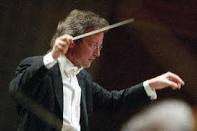|
Back
Dessert before Dinner Miami
Knight Concert Hall
01/25/2013 - & January 23 (Cleveland), 26 (Miami), 2013
Ludwig van Beethoven: Violin Concerto in D Major, Opus 61
Dmitri Shostakovich: Symphony No. 10 in E Minor, Opus 93
Joshua Bell (violin)
Cleveland Orchestra, Franz Welser-Möst (conductor) 
F. Welser-Möst (Courtesy of CO)
People often want to point out the personal, historical and political events surrounding the creation and eventual appreciation of Shostakovich's Symphony No. 10. But why? It does not seem especially difficult to find an interpretation of what this great composer was doing here, without knowing that it premiered after the death of Stalin. The first movement is introspective for the first half with some beautifully sad and questioning sounds coming from the wind section giving way to the very dramatic, then eventually returning to an almost bleak mood that is surrounded with a very eerie dance rhythm. Franz Welser-Möst keeps the strings very tight not allowing the intensity to slacken. With a lazy conductor, this great movement could easily lose its power. The second takes us on a very different journey, a short and energetic thrill ride, albeit, at times a very frightening one. The third is the bleak part, though certainly not dull; it might be described as menacing depression though that doesn't seem like it would be much fun. That is why this symphony is such a marvel; you never get what is expected. And because it is the work of a master orchestrator, the most seemingly minor moments stick in the memory. Then this most essential Soviet composer tops it off with continuing the hapless mood of the third eventually finding even moments of romance before concluding with a sense of optimism that certainly will never be described as happy and comforting, not even triumphant. Others undoubtedly will find moods that are entirely different, This is precisely what makes a great composer so valuable, that ability to speak unexpectedly in ways never even intended. There is such depth and detail to this symphony that it takes many exposures to even grasp it even superficially. One leaves this performance neither bored nor satisfied, Welser-Möst makes sure of that, fortunately with a minimum of machinations. Most recordings of this work run approximately fifty minutes, and though I didn't time it myself, this performance felt much shorter. “But what does it all mean,” I heard people saying as I left the auditorium. Can anyone, even the composer himself put that into mere words? If so, then why listen?
The evening got off to a rapid start with Joshua Bell's interpretation of Beethoven's Violin Concerto. Though Bell has been around a long time, he will always give the impression of being a late teenager, performing in what most would describe as rehearsal clothes: black denim trousers, black Durango boots with a matching colored shirt giving an attitude of confidence and absolute pleasure in his work. There is a lightness to his playing of this overly familiar work that gives it a freshness that is greatly welcomed. Bell's own cadenzas come across like jazz riffs as he transcends the orchestra. Still, it must be a pleasure for an orchestra to have a soloist who is as attentive to them; much of the performance was performed with the violinist facing the musicians.
A lot of praise must also be given to Miami's audience which remained committed even after the evening's star had returned to his dressing room. The best concerts are the ones where there is mutual give and take between performers and spectators. Not only from the ovations was the appreciation recognizable; the silent concentration spoke volumes.
Jeff Haller
|